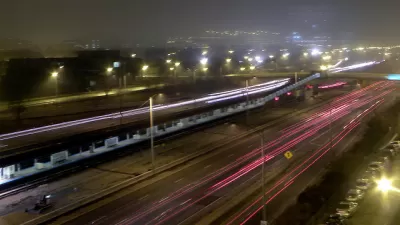Legislation to enable the addition of express toll lanes on Interstate 55 in the Southwest Side of Chicago, opposed by environmental justice advocates, cleared the Illinois General Assembly last month.

“Illinois lawmakers have cleared a path forward for a long-discussed expansion of I-55, despite concerns from neighbors and environmental groups about the way the project could be funded and the repercussions of adding more lanes to the expressway,” reports Sarah Freishtat for the Chicago Tribune on May 26.
In the final weeks of the legislative session, lawmakers moved to allow the Illinois Department of Transportation to pursue a public-private partnership to complete an expansion of I-55. Such a partnership, which would allow private investment in proposed new toll lanes on the expressway, is one way IDOT could secure funding to move the project forward.
The proposed expansion could include adding express toll lanes to the highway, which runs through part of Chicago’s Southwest Side and on toward Joliet.

Flash back five years when Planetizen editor James Brasuell was following the project :
- Federal Approval, But No Funding for Chicago Toll Lanes, August 25, 2017
Though the federal government approved the plan for toll lanes, called managed lanes in Illinois, the state lacks the funding to implement the idea. Two toll lane proposals are currently in limbo. - Illinois DOT Expands its I-55 Express Lane Ambitions, December 11, 2017
A proposal to add express lanes on a notoriously congested stretch of I-55 that passes through the western Chicago suburbs could expand from $25 million to $700 million with the addition of an extra toll lane.
Transportation legislation
An article for Chicago's PBS station, WTTW, that focused largely on the opposition to the project, also provided the legislative details.
“House Bill 2878 and House Joint Resolution 23 (HJR23) both include provisions that would expand the scope of public-private infrastructure partnerships, in effect ceding a portion of control over planning and development to private entities, opponents said during a press conference Tuesday,” reported Patty Wetli on May 25.
Environmental justice activists from Chicago communities located along the I-55 corridor said more lanes for vehicles would only lead to more pollution and more congestion in neighborhoods already over-burdened with emissions from trucks and cars. Activists called, instead, for the state to stretch its imagination and dream up holistic solutions for neighborhoods that would incorporate pedestrian, bicycle and public transit options.
Joint resolutions need not be signed by the governor. No word on whether Gov. JB Pritzker will sign HB 2878.
Chicago and public-private partnerships
Public-private partnerships are often used to build infrastructure projects. In the Windy City, though, a controversy involving the privatization of Chicago parking meters explains WTTW's reference to “parking meter-style deal” in their title.
According to Freishtat of the Tribune, the project is by no means on the fast track.
Any new toll lanes along I-55 would likely be years away. IDOT previously completed studies of the proposed expansion, but officials said in a statement Friday the agency was not pursuing plans for the expansion at this time. The agency would be reviewing the legislation and evaluating next steps, they said.
FULL STORY: Lawmakers clear a path for future expansion of I-55 over environmental, neighborhood concerns

Trump Administration Could Effectively End Housing Voucher Program
Federal officials are eyeing major cuts to the Section 8 program that helps millions of low-income households pay rent.

Planetizen Federal Action Tracker
A weekly monitor of how Trump’s orders and actions are impacting planners and planning in America.

Ken Jennings Launches Transit Web Series
The Jeopardy champ wants you to ride public transit.

Rebuilding Smarter: How LA County Is Guiding Fire-Ravaged Communities Toward Resilience
Los Angeles County is leading a coordinated effort to help fire-impacted communities rebuild with resilience by providing recovery resources, promoting fire-wise design, and aligning reconstruction with broader sustainability and climate goals.

When Borders Blur: Regional Collaboration in Action
As regional challenges outgrow city boundaries, “When Borders Blur” explores how cross-jurisdictional collaboration can drive smarter, more resilient urban planning, sharing real-world lessons from thriving partnerships across North America.

Philadelphia Is Expanding its Network of Roundabouts
Roundabouts are widely shown to decrease traffic speed, reduce congestion, and improve efficiency.
Urban Design for Planners 1: Software Tools
This six-course series explores essential urban design concepts using open source software and equips planners with the tools they need to participate fully in the urban design process.
Planning for Universal Design
Learn the tools for implementing Universal Design in planning regulations.
Ada County Highway District
Clanton & Associates, Inc.
Jessamine County Fiscal Court
Institute for Housing and Urban Development Studies (IHS)
City of Grandview
Harvard GSD Executive Education
Toledo-Lucas County Plan Commissions
Salt Lake City
NYU Wagner Graduate School of Public Service



























